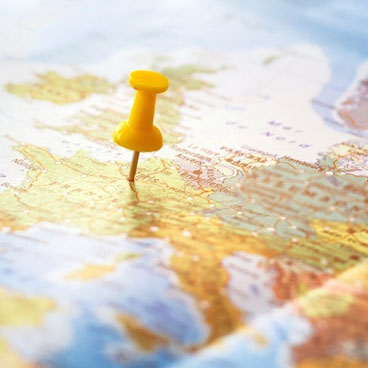
Living in the United States is the dream of many people in Brazil and around the world. The USA is a country of reference and a land of opportunities, especially for Brazilians.
The truth is that the interest of living abroad can vary from person to person. However, there are several common factors that induced this feeling.
The United States offers many chances for professionals where they get higher and better career prospects. There are Brazilians who want to live in the US to achieve their educational, professional or business goals. Pursuing a higher education in the US can provide you with valuable skills and open doors to career options around the world. For example, I came to improve my conversational English, I graduated in business administration and sociology at New York University.
The country undoubtedly allows you to have a better quality of life, as it has a reliable infrastructure, access to advanced medicine, security and a better social welfare system. These factors may be attractive to Brazilians seeking a higher standard of living or better general socioeconomic conditions. But make no mistake, here in the US there is a lot of poverty too. I have always worked in the human services field and directly with low-income people. There are opportunities, of course, but there is also social inequality, as in many countries. I distribute a basic food basket every month to some customers who are unemployed and receive government assistance.
In my opinion, what counts a lot for a large majority to decide to live in the US is the influence of American media such as movies, TV shows, music and literature. The US has a significant cultural impact around the world, including Brazil. This influence can lead to a fascination with American culture, language, lifestyle and motivate people to seek out experiences living in the US.
I came for the first time to do an exchange program and work in upstate New York in 2008. I studied English for almost a year in Manhattan, went back to Brazil at the end of 2009 and returned for good in 2011. Although that was my choice I miss many things from Brazil.
Not all people miss the same thing because we are unique human beings.
I made a list of the things I miss the most here in the US:
- Family
- Friends
- Godson & Goddaughter
- Access to places that marked my childhood and adolescence.
- Gathering my friends from Brazil on my birthdays
- Pizza rotation
- Brazilian food (dried meat with pumpkin, moqueca, feijoada, tropeiro beans, etc.)
- Brazilian sandals
- The price of beauty salons in Brazil
- Beauty products from Brazil
- Crowded beach and loud music
- New year on the beach
- Spend Carnival in the lake region
- Pagode and barbecue on Sundays
My list is not that big and part of it is fulfilled when I am in the Brazilian community in New York, or with my family here and my Brazilian friends who live in the city as well. The only thing you can't replace is the people you leave behind in Brazil.
Leaving behind family, friends and a support network can be emotionally challenging. The absence of intimate relationships and the desire for emotional connection are the hardest things for immigrants.
Being an orphan and raised my whole life with my paternal grandmother, Neide, the decision was not easy because I was very attached to her.
I always imagined that I would get married and live in a house with a big yard to have a little house for her in the back or I would buy an apartment in the same block as ours so that we could be close. I had never really planned to live permanently in the US, but it happened.
I grew up listening to her say that people raise their children for the world and it's true. Each of us has a destiny and the role of our caregivers is to guide us so that we can choose the best paths and make the right decisions.
I was very judged by my family and accused of abandoning my grandmother, which was totally unfair. For all children usually leave home when they marry. It was just me and my grandmother for years, but when it was my turn to leave the house, I was criticized. It's common and a usual thing for you to leave home and live in the same state, and sometimes you even change states, but it's not that common for people to leave home to live in a distant country. So I understand the shock for some people in my family, but it still wasn't their role to criticize me.
My grandmother was already elderly and I had the immense support of my aunt and cousin who moved in with her for many years and then my grandmother ended up moving to my aunt's house. If it weren't for them, I wouldn't be here today. I came with peace of mind because I knew she wouldn't be alone.
So, without a doubt, what I miss the most is family ties with some people.
I called practically every day to talk to my grandmother and over the years we were able to make video calls with the advancement of technology. Nowadays, living at a distance has become much more practical and you can manage nostalgia better.
I made a promise to myself that every year I would visit my grandmother, as much as I wanted to use my vacation to go out and see the world, my priority was her and I fulfilled it. My last visit was in 2019 where I really enjoyed my little voice and recorded several videos. In March 2020 came the pandemic, it was not possible to leave the country easily and she passed away in October 2020. Her passing was very difficult for me, I know she needed to rest, but it is very sad not being able to say goodbye. And this is a reality that immigrants face when living outside their country, because in Brazil burials happen very quickly and depending on where you are, there is no time to travel.
This burial, in addition to being sad, brought a huge upheaval in my life. Where people thought they had the right to bury my grandmother without telling her other family members. That was such a cowardice that I can't understand how people can do that to someone in their own family. Obviously family ties were broken, but it didn't affect that much because they were the same ones who criticized my move to the US. The best way I found to deal with my anger was to write a book that will one day be published telling the full story. Walking away and cutting ties was the best thing I could have done. Today I remain at peace with the people I chose to live by my side and be part of the next chapters of my story.
Without a doubt, living abroad gives us nostalgia. It is common to miss the familiar sights, sounds, smells and tastes of your home country. We feel a nostalgia for the places we grew up, the childhood memories and cultural traditions that can generate a desire to return to Brazil.
I really missed 2009 a lot and decided I wanted to go back to Brazil. I think that happens to some people. You have to go back to appreciate the opportunities here in the USA.
I continue with the promise of going to Brazil at least once to see my godson Lucas and now with the arrival of sister Alana who I consider my goddaughter as well. They are my heart children. On these trips I always see my family, aunts, uncles, nieces, cousins and friends. I saw my maternal grandfather in March 2023 and it was emotional.
I am very attentive with all my relationships and I always try to keep in touch even if the distance.
Living abroad often exposes people to different cultural norms, values and ways of life. This can be attributed to nostalgia for our country's cultural familiarity, such as language, customs, celebrations and especially social interactions. The bonds of shared experiences and a sense of belonging to a specific culture can be significant contributors.
Brazilian cuisine, for example, is a strong connection with cultural identity and brings feelings of comfort, nostalgia and satisfaction. I say that the unavailability of traditional foods or the difficulty in replicating flavors abroad can stimulate nostalgia in many people, but this can be solved in Brazilian communities, as I mentioned earlier. I live in upstate New York and here there are no Brazilian products, but I am an adaptable person and I am used to eating American food and their style.
It's extremely challenging to live in another country because it has all these barriers; you will have to navigate different systems and adjust to different social dynamics.
Every change has its positive and negative side, but if you are a flexible person it helps a lot to overcome these obstacles.
It is important to remember that the experience of missing Brazil while living abroad is extremely individual and can vary according to personal circumstances, family ties, cultural background and time spent away from home. For many people homesickness can be easier to manage over time, as they make new connections, adapt to their new surroundings, and create a sense of home in the country they choose to live in.
And you, do you miss or would you miss anything from Brazil?
Read also 15 Reasons to move abroad


